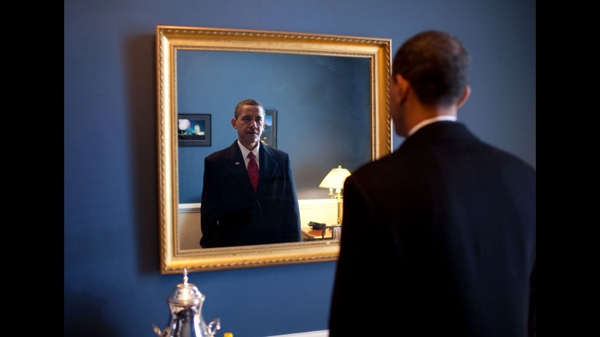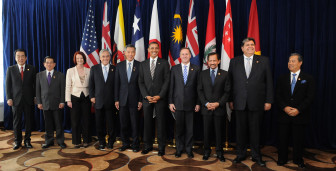
White House
Obama, seen just before his inauguration seven years ago today.
President Barack Obama’s last State of the Union address featured an incongruent call for congressional approval of a policy that would undermine many of the landmark achievements of his presidency.
He prioritized passage of the Trans-Pacific Partnership (TPP), a controversial trade deal that would undermine Obama’s legacy of economic recovery, climate, health care access, LGBT equality, financial reform, and U.S. auto industry rescue achievements.
The final TPP text was finally released in November after seven years of secretive negotiations during which 500 official U.S. trade advisors representing corporate interests had special access and Congress, the public and press were shut out.
While Obama touted the American jobs he has created, the TPP includes rules that make it cheaper and less risky to offshore more American jobs to low wage countries. The pro-free trade Cato Institute calls these investor protections a subsidy on job offshoring.
A recent economic modeling study concluded that netting out potential gains and losses, the pact could cost another 450,000 American jobs. Since the North American Free Trade Agreement (NAFTA), we have endured a net loss of more than 57,000 U.S. manufacturing facilities and already have lost one out of every four American manufacturing jobs.
The TPP also would directly contradict Obama’s efforts to reduce U.S. health care costs by expanding monopoly patent protections for big pharmaceutical firms. This allows them to stop competition and raise medicine prices. The TPP would also empower large drug firms to meddle in U.S. government reimbursement decisions for taxpayer-funded programs like Medicare and Medicaid.
The TPP would even undermine the president’s successful rescue of the U.S. auto industry, which saved thousands of U.S. jobs. It would allow vehicles comprised mainly of Chinese and other non-TPP country parts and labor to gain duty free access here. This would gut the rules of origin established in NAFTA that condition duty free access on 62.5 percent of value being from NAFTA countries. Ford has supported all past U.S. trade deals, but opposes the TPP.

Government of Chile
These world leaders back it, but who's not down with TPP? Click here to hear more about local opposition.
Senator Elizabeth Warren has warned that the TPP could help banks unravel the new rules Obama achieved on Wall Street by prohibiting bans on risky financial products and “too big to fail” safeguards while empowering foreign banks to “sue” the U.S. government over new financial regulations.
So why is Obama pushing the TPP? He said it provides tax cuts on 18,000 products and thus would boost exports. But we already have free trade deals that cut these taxes with the TPP countries accounting for 80 percent of the TPP bloc’s economic activity. And we do not even sell a majority of the 18,000 products that get the tax cuts.
The president also said we need TPP to counter China. But the final TPP text rolls back national security language included in all past U.S. trade deals for a decade. And, the TPP rules would undermine our national interests and weaken us by providing benefits for firms that offshore American jobs, give banks new tools to roll back Wall Street regulations, and empower foreign firms to “sue” the U.S. government and raid our Treasury over our health and environmental policies.
The TPP would double down on NAFTA’s rules – the opposite of Obama’s 2008 campaign promise to renegotiate the unpopular pact. Obama must choose between his agenda and its legacy or the TPP: He cannot have both.
Freddy Castiblanco is the owner of local small business Terraza 7 (a jazz venue), and a member of the Roosevelt Avenue Community Alliance and the Polo Democratico Alternativo NY.









4 thoughts on “CityViews:
Queens Biz Owner Knocks Obama’s Trans-Pacific Trade Deal”
I believe the author of this article represents many Obama supporters who are apprehensive about TPP. His last statement says it all. Thank you for your thoughtful interpretation
Not only can China join the TPP, but Hillary Clinton already invited China to join when she was secretary of state. As for tariff reduction, the TPP does little if anything to address currency manipulation and VAT taxes (value added taxes) which other countries use to negate the lowering or elimination of their tariffs. And many touted new markets would be in countries like Vietnam – the minimum wage in Vietnam is 65 cents an hour – where the general population cannot afford American made products. What the TPP would do is send jobs overseas and bring in more foreign workers. It would also set up a panel of twelve nations whose votes would supersede the votes of our Congress, and thus our votes. The TPP would expand the power of multinational corporations to sue us if our laws conflicted with their “expected future profits” in hearings in which corporate lawyers would basically be the judge and jury. Congress recently repealed our Country of Origin Labeling laws for certain meats because we were under threat of over one billion dollars a year in sanctions because of NAFTA. The vast majority of Americans want the protection of Country of Origin Labeling. Australia, BTW, did not agree to be vulnerable to these lawsuits through the TPP, but United States negotiators did.
You can get more information about the Trans Pacific Partnership by googling Public Citizen. You can also find out about the devastating effects of past trade agreements on our country by googling Public Citizen and also Congressman Alan Grayson’s video: No to Fast Track, No to Trade Treachery, which you can find on YouTube. An article of interest: International Business Times: Trans Pacific Partnership: Industries Favoring Trade Agreement Gave Lawmakers 8.6 Times More Money Than Industries Opposed. Senator Jeff Sessions and Nobel Prize winning economist Joseph Stiglitz are also fierce opponents of the TPP.
Please call your senators and representative to tell them to Vote No to the TPP. If you live in New York State our senators are probably going to vote against the TPP, but it is a good idea to call them anyway and important to urge Senator Schumer to do all that he can to fight it. And be aware that record numbers of people around the country called to tell their legislators to Vote No to Fast Track for the TPP but this was basically ignored, so if you can do more to try to help stop the TPP please do. You can find out actions you can take by contacting organizations like Public Citizen and Food and Water Watch. There has been very little about the TPP in the news, so please tell as many people as you can about it. Thank you for doing anything that you can. The TPP has no expiration date.
It all comes back to who Pres. Obama works for. It is not the public and small business, or not even large businesses “like Ford.” Obama works for the evil remnants of the British Empire, aka the British Commonwealth… Sometimes this is defined by the English speaking countries, the US, the UK, Australia, New Zealand and Canada. But, obviously this will destroy the US Constitution and all the things that makes the USA different than the other more “British” members of this group. As usual, LaRouche Pac is right.
Obama is notorious for placing wealthy Citigroup officials inside his
administration where they set key government economic policies. One of those
wealthy and powerful Citigroup officials is Michael B. Froman, who is also a
Robert Rubin protégé. It just gets better and better. Froman is Obama’s top
trade negotiator, which helps explain why the TPP is such a substantive disgrace
that Froman has been desperate to prevent the American people from knowing what
is about to be done to them.
(Btw, when Citibank merged with Travelers Insurance to become the serially
criminal Citigroup, violating Glass-Steagall in the process, Froman was its
managing director. Bill Clinton subsequently repealed Glass-Steagall with the
Gramm-Leach-Bliley Act. The rest is history.)
In case anyone’s interested, here is U.S. Trade Representative Michael
Froman’s employment history:
— 2013-Present: US Trade Representative
— 2009-2013: Deputy Assistant to the President
— 2008-2008: Obama-Biden Advisory Board Member
— 1999-2009: Managing Director of Citigroup
— 1997-1999: Treasury Dept. Chief of Staff
— 1993-1995: National Economic Council Director of International Economic
Affairs
— US German Marshall Fund Resident Fellow
— American Bar Assn Central and East Europe Liason
— Council on Foreign Relations Fellow
https://www.opensecrets.org/revolving/rev_summary.php?id=70879